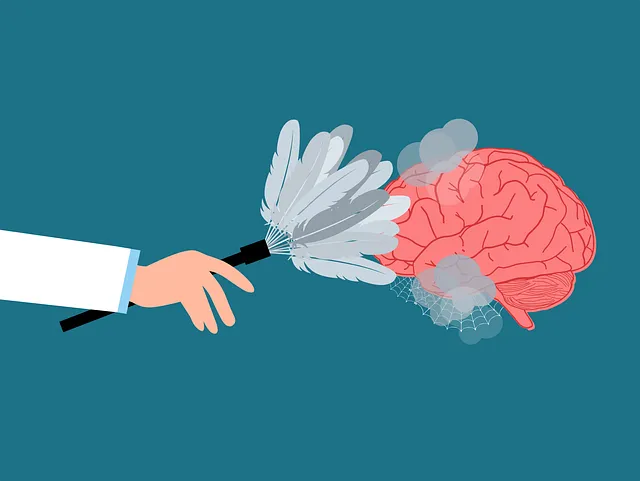Kaiser Permanente mental health Lakewood emphasizes community well-being through its Resilience, Flexibility, Mastery (RFM) programs. These initiatives focus on emotional healing and stress management for healthcare providers, leveraging mindfulness exercises to combat burnout and anxiety. By integrating RFM principles into public health programs, Kaiser Permanente cultivates resilience in residents, promoting harmony and stability in the community. The program's success is demonstrated through case studies showing enhanced coping mechanisms and reduced stress levels among participants.
“Discovering the power of Resilience, Flexibility, and Mastery (RFM) in shaping mental well-being is a revolutionary approach, especially within healthcare systems. This article explores how Kaiser Permanente Lakewood integrates RFM exercises into their mental health support, fostering community resilience. We delve into the positive impact on individuals’ ability to navigate life’s challenges, offering a unique perspective on improving mental health outcomes. Through case studies and strategic implementations, we uncover effective methods, providing insights for healthcare professionals aiming to enhance patient care in Kaiser Permanente Lakewood and beyond.”
- Understanding RFM and Its Impact on Mental Health: A Kaiser Permanente Lakewood Perspective
- The Role of Resilience-Building Exercises in Fostering Community Wellbeing
- Implementing Effective RFM Programs: Strategies for Success at Kaiser Permanente Lakewood
- Case Studies: Real-World Examples of RFM's Positive Outcomes in Mental Health Support
- Overcoming Challenges and Measuring the Effectiveness of RFM Initiatives at Kaiser Permanente Lakewood
Understanding RFM and Its Impact on Mental Health: A Kaiser Permanente Lakewood Perspective

At Kaiser Permanente Lakewood, we recognize the profound impact of mental health on our community, especially within the healthcare sector. Understanding RFM (Resilience, Flexibility, and Mastery) principles is a game-changer in fostering resilience among healthcare providers. This approach focuses on building emotional healing processes, which are essential tools to combat burnout prevention strategies for healthcare providers.
By integrating RFM into our practice, we aim to enhance anxiety relief and overall well-being. The concept encourages professionals to develop flexibility in the face of challenges, allowing them to adapt and navigate stressful situations effectively. Mastery, the final aspect, empowers individuals to take control and find solutions, thereby strengthening their resilience against mental health issues such as burnout, stress, and anxiety.
The Role of Resilience-Building Exercises in Fostering Community Wellbeing

Resilience-building exercises play a pivotal role in fostering community wellbeing, especially within areas like Lakewood where organizations such as Kaiser Permanente prioritize mental health initiatives. These exercises are designed to help individuals cope with adversity and build strength against life’s challenges. By integrating Stress Reduction Methods and Depression Prevention strategies, communities can create a supportive environment that encourages emotional resilience.
Through Mental Health Policy Analysis and Advocacy, local efforts can ensure these exercises become integral parts of public health programs. This approach not only equips individuals with tools to navigate difficult situations but also promotes overall community harmony and stability. By fostering resilience, Lakewood and similar areas can build a more robust safety net for their residents, enhancing the collective ability to withstand and recover from stressful events.
Implementing Effective RFM Programs: Strategies for Success at Kaiser Permanente Lakewood

Implementing effective RFM (Resilience, Flexibility, and Mindfulness) programs at Kaiser Permanente Lakewood involves a strategic approach that prioritizes employee well-being. The organization recognizes that mental health is a cornerstone of overall wellness, especially in the demanding healthcare sector. By integrating RFM initiatives into their workplace culture, Kaiser Permanente Lakewood aims to enhance resilience among staff, fostering an environment that supports both professional and personal growth.
This strategy includes tailored workshops and training sessions focusing on anxiety relief techniques, crisis intervention guidance, and burnout prevention strategies. The program encourages employees to develop mindfulness practices, promoting better stress management and emotional regulation. Through these initiatives, Kaiser Permanente Lakewood strives to create a supportive network where individuals can thrive, ensuring that their mental health is just as valued as their clinical expertise in providing exceptional patient care at the Lakewood location.
Case Studies: Real-World Examples of RFM's Positive Outcomes in Mental Health Support

In real-world settings, the implementation of RFM (Resilience and Fitness Management) programs has demonstrated remarkable positive outcomes in mental health support, particularly at organizations like Kaiser Permanente in Lakewood. These case studies highlight how structured resilience-building exercises can significantly enhance individuals’ coping mechanisms and overall well-being. For instance, Kaiser Permanente’s integration of mindfulness meditation and self-awareness exercises into their mental health services has been met with success, fostering a sense of calm and reducing stress levels among employees and patients.
Furthermore, the program’s focus on trauma support services has proven beneficial for individuals dealing with past traumatic experiences. By providing safe spaces for sharing and processing emotions, RFM has facilitated healing and growth, showcasing its potential to revolutionize mental health care. These examples illustrate how tailored resilience-building initiatives can positively impact communities, making them more resilient in the face of life’s challenges.
Overcoming Challenges and Measuring the Effectiveness of RFM Initiatives at Kaiser Permanente Lakewood

At Kaiser Permanente Lakewood, implementing RFM (Resilience, Flexibility, and Mastery) initiatives has proven to be a game-changer in enhancing mental health services. Overcoming challenges within a complex healthcare environment requires innovative strategies. The organization recognized the need to go beyond traditional stress management techniques and foster a more holistic approach. By integrating RFM practices, they aimed to empower patients with effective coping skills development and emotional intelligence, enabling them to navigate life’s hurdles with resilience.
The effectiveness of these initiatives is evident in the positive outcomes reported by both patients and healthcare providers. The tailored programs address individual needs, offering unique pathways for personal growth. Through regular assessments and feedback mechanisms, Kaiser Permanente Lakewood ensures that the RFM exercises remain relevant and impactful. This measured approach allows them to track progress, identify areas for improvement, and continuously enhance their mental health support systems, ultimately reflecting a commitment to the well-being of both patients and staff in the bustling Kaiser Permanente mental health Lakewood community.
The implementation of Resilient Factors (RFM) and resilience-building exercises in Kaiser Permanente Lakewood’s mental health support systems has demonstrated significant positive outcomes. By fostering community wellbeing, these programs enhance individuals’ ability to navigate life’s challenges. The case studies presented highlight the real-world impact of RFM on mental health improvement. Overcoming initial challenges through strategic implementation, as outlined in this article, can lead to effective resilience-building within healthcare systems, ultimately benefiting Kaiser Permanente Lakewood’s patients and their communities.






